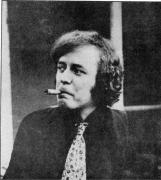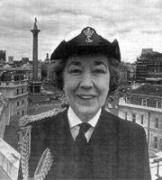|
|
||||||||||||||||||||||||
 |
Featured person
Recently added |
Stewart Parker (1941 - 1988): |
||||||||||||||||||||||

|
Stewart Parker was born on 20th October 1941 at 86 Larkfield Road, Sydenham, Belfast, into a working class Protestant family. He was educated at Strand Primary, Ashfield Secondary (where he came under the influence of the great educator John Malone), Sullivan Upper and Queen's University, Belfast.
While still at Queen's he contracted bone cancer and had to have a leg amputated, but in spite of that took an active part in university life. He was a member of the group of young poets set up by Philip Hobsbaum (along with people like Seamus Heaney and Derek Mahon). Having completed his MA in Poetic Drama he moved to the USA in 1964, where he taught in Hamilton College and at Cornell University at a pivotal time in US politics.
Returning to Belfast in 1969 and moving later to Edinburgh and London, he lived by his pen, contributing a column on pop music to the Irish Times and devoting his creative energies to the broad field of drama, for stage, radio and television. His first stage play, Spokesong (1975) depicts Belfast life through the eyes of the proprietor of a bicycle shop. It was the hit of the Dublin Theatre Festival and went on to gain success in London, New York and beyond, winning the 1976 London Evening Standard Most Promising Playwright award.
Many other works followed (two volumes of stage plays were published by Methuen Drama after Parker's death). Among his television plays the best known is perhaps Catchpenny Twist, a freewheeling work about the Eurovision Song Contest with a tragic sting in the tail. His radio and television work was published by the University of Prague as Dramatis Personae and Other Writings - these include his 1986 John Malone Memorial Lecture.
Stewart Parker's plays are marked by virtuosity and experiment. He excelled in handling philosophy and politics within the format of popular culture, for example in Heavenly Bodies, his play about the Victorian playwright and entrepreneur, Dion Boucicault. Joyce In June (James Joyce was a writer he greatly admired) interweaves scenes from the novelist's life with the hilarious visit of a concert party - which includes several figures from Ulysses - to Belfast. Perhaps the most original of his works is Northern Star, which depicts Henry Joy McCracken's final hours of freedom after the failure of the 1798 rising. McCracken muses on his intellectual pilgrimage from revolutionary idealism to a more chastened realism, in a series of virtuoso scenes written in the styles of Sheridan, Boucicault, Wilde, Shaw, Synge, O'Casey, Behan and Beckett.
Stewart Parker's final stage play Pentecost (1987), which won the Harvey's Irish Theatre Award, is - at least on the surface - more naturalistic. It centres on four misfits, making up a cross-section of the classes and cultures of Northern Ireland; who find themselves trapped in an empty East Belfast parlour house at the time of the 1974 Ulster Workers' Council Strike (which brought down the Sunningdale Agreement). Of these the central character, Marion, is aware of an unseen fifth inhabitant of the house; namely the ghost of Lily Mathews, a devout Loyalist who had formerly lived there. In spite of its grim setting, the play comes to a cautiously hopeful conclusion - something that seemed improbable at the time but may well turn out to have been prophetic.
A year later, in 1988, Stewart Parker was dead, from cancer. Twenty years after that event the Lagan Press of Belfast brought out High Pop, a selection of his Irish Times articles; this was launched, along with Dramatis Personae, during a festival and conference commemorating the work of this major writer held at Queens in November 2008.
The Stewart Parker Trust was established in his memory to encourage and acknowledge new writing for the theatre in Ireland. His birthplace is marked by an Ulster History Circle blue plaque.
| Born: | 20 October 1941 |
| Died: | 2 November 1988 |
| Patrick Devlin |


Home | Our Policies | Plaques | Browse | Search | Sponsors | Links | Help | Contact
Privacy & Disclaimer | Cookie Policy | Site Map | Website Design By K-Point
© 2024 Ulster History Circle









